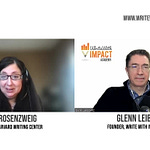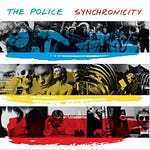(Stay-tuned! In August we’ll be sharing a 4-part series of Writing Masterclasses with published authors, writing coaches, and book marketing experts focused entirely on writing, publishing, and marketing your first book!)
Amy Blaschka is one of the most productive writers I know.
As a social media ghostwriter and storyteller, she helps busy entrepreneurs and C-suite executives craft compelling content that people want to click and share.
She also writes prolifically under her own byline across multiple platforms, including on LinkedIn, where she has attracted a large group of followers that is rapidly approaching 70,000.
Amy is also a regular contributor to Forbes.com, where imparts leadership advice in a column she’s been publishing five times per month for the past three years.
And, as if all that weren’t enough to keep her brain busy, this year she launched a newsletter on Substack she calls, “Illuminate Me,” where she shares her less filtered musings on life, business, and everything in-between.
Amy is no mere content creation “machine.” Having known Amy through LinkedIn, and having read her articles and watched her videos for many years now, I can personally attest to the positive energy she radiates through everything she does. However she communicates—through the written word, in a brief selfie-style video, or on a podcast—she does it all with a smile.
I recently had the privilege to grab Amy for a whole hour for a Writing Masterclass. After explaining what a ghostwriter really does, she revealed some of the core strategies she uses to help her clients turn their ideas into clickable and shareable content.
She also shared her techniques for generating a stream of ideas she can tap into at any time, her approach to conquering the dreaded blank page, and the app she uses to create the colorful graphics that bring her content to life.
Here are just four of the several practical writing tips Amy shared in her Masterclass (lightly edited for length and clarity).
(Note: This is just a brief excerpt—there’s much more she shared in the full version of her Writing Masterclass, which you find right here.)
Find your “zone of genius” (and stick to it)
My big three concepts, which I apply to my clients and to myself, and which can be applied to anyone else out there, are clarity, consistency, and discipline.
Clarity of message: Keep it to one idea and know what you're trying to say and be very intentional with that.
And then consistency: Make sure you do it regularly.
And the discipline to stay in your wheelhouse. Because, if you saw me posting about blockchain or cryptocurrency, you'd probably be like, what is Amy talking about?
That repetition and that discipline of staying in the one, two, or maybe three buckets where you are expert, they call it the “zone of genius.” Whatever you want to call it, it’s what you want people to come to associate with you.
It's true that if you put too much out there, if you veer too far from your supposed expertise, you're going to confuse people. And if you confuse them, you will lose them. They will keep scrolling. They'll ignore you. They'll disconnect or unfollow you.
They’ll wonder, maybe this person doesn't know what they want, or what they're about. Why should I bother giving them my attention? It comes down to attention and trust. These are the two things that Seth Godin said are the “currencies.” You want to make sure you try to gain those.
Focus on 1 key take-away
A lot of my clients are entrepreneurs and founders, and typically those people are full of great ideas. But it's about executing on one idea. I will keep track of all those ideas and say, okay, that's great. That could be a future post. We could do this, but let's focus on one. I really help them focus and get clarity around what is the one takeaway.
When I'm working with a client, I ask, “What do we want to say here? What do you want to leave people with? What do you want them to take away from this post? What is important?” What's that one thing that forces you to stay in that lane, because it's very easy to go off on a tangent.
Sometimes we'll just keep talking, and the thing that we thought we were going to write about turns into something else as they talk it through. Because, not surprisingly, a lot of my clients are what I call “talkers.” They think as they speak out loud, though a lot of us don't do it that way. We think in our heads, and then we write it down.
It helps them get a little clarity too, particularly because we are writing about their everyday life, their everyday world. It could have been a client meeting they had, it could have been something with their staff, it could have been dealing with the pandemic. It could be anything. And that's really what works best.
Share your expertise (and have confidence in your ability to have impact)
With each post it’s really about serving, not selling. The kind of writing I'm doing is not a sales campaign. It's not designed to talk about your latest offering or product. It's not that at all.
Some people are like, wait a minute, what are you writing about? It's very foreign to them to share anything other than “hire me.” It's really about providing value. And the way you do that is you share your expertise. Every person I've talked to is like, I don't know if I have anything to share. How could my story and what I'm doing really impact anyone else?
You always, always have an impact. Once you've put something out there it will impact at least one life. And they will tell you, maybe privately, or months after that post, “I've been following you for a while and wow, I really like the way you think, I like the way you move through the world, I like your perspective.” This happens to my clients, too.
That’s super meaningful for the person who's putting the content out because often they have no idea (if anyone is reading) and they think they might just be shouting into the abyss.
Be human!
I think there is this misperception that on social media, you have to just share all the wins and you have to have what I call the Instagram worthy, curated content. It’s like there’s only the good stuff, because God forbid you share anything that would portray you as someone who's made a mistake or had a supposed failure.
But the opposite is true. People respond to humans, to imperfect people. And when you're a leader, of course you've made mistakes. Everybody has stumbled. But the important thing is, when you're sharing about that, is to say, you know, this happened, but this is how I found my way out. And something like that will endear you to other people; they'll also come to see you as human. You leave them with something that they connect better with, because you're not somebody that's up on a pedestal imparting your wisdom.
That genuineness really translates well across social media, because we both know there are a lot of people that do the opposite. And sorry, you're going to alienate people, or they're going to keep scrolling. I would personally much rather read and share something that is real world, real life.
This was just an excerpt from a longer Writing Masterclass with Amy Blaschka. To watch and listen to the entire class, and to get access to all of the content in Write With Impact Academy, consider becoming a paying subscriber. We’re offering a 14-day free trial so you can look around before making a commitment.
And be sure to stay-tuned! In August we’ll be sharing a 4-part series of Writing Masterclasses with published authors, writing coaches, and book marketing experts focused entirely on writing, publishing, and marketing your first book!















Share this post